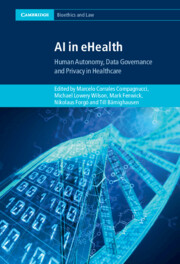Book contents
- AI in eHealth
- Cambridge Bioethics and Law
- AI in eHealth
- Copyright page
- Contents
- Contributors
- Preface
- Acronyms
- 1 Mapping the Digital Healthcare Revolution
- Part I Platforms, Apps and Digital Health
- Part II Trust and Design
- Part III Knowledge, Risk and Control
- 8 The Principle of Transparency in Medical Research
- 9 The Next Challenge for Data Protection Law
- 10 A Global Human Rights Approach to Medical Artificial Intelligence
- Part IV Balancing Regulation, Innovation and Ethics
- Index
- Cambridge Bioethics and Law
- References
10 - A Global Human Rights Approach to Medical Artificial Intelligence
from Part III - Knowledge, Risk and Control
Published online by Cambridge University Press: 08 September 2022
- AI in eHealth
- Cambridge Bioethics and Law
- AI in eHealth
- Copyright page
- Contents
- Contributors
- Preface
- Acronyms
- 1 Mapping the Digital Healthcare Revolution
- Part I Platforms, Apps and Digital Health
- Part II Trust and Design
- Part III Knowledge, Risk and Control
- 8 The Principle of Transparency in Medical Research
- 9 The Next Challenge for Data Protection Law
- 10 A Global Human Rights Approach to Medical Artificial Intelligence
- Part IV Balancing Regulation, Innovation and Ethics
- Index
- Cambridge Bioethics and Law
- References
Summary
The use and development of algorithms in health care, including machine learning, contributes to the discovery of better treatments for patients and offers promising perspectives in the fight against cancer and other diseases. Yet, algorithms are not a neutral health product since they are programmed by humans, with the risk of propagating human rights infringements. In the medical area, human rights impact assessments need to be conducted for applications involving AI. Apart from offering a consistent and transversal substantive approach to AI, human rights law, and in particular the UN Guiding Principles on Business and Human Rights, would allow the targeting of all stakeholders, including the corporations developing health care algorithms. Such an approach would establish a chain of duties and responsibilities bringing more transparency and consistency in the overall process of developing AI and its later uses. Although this approach would not solve all AI challenges, it would offer a framework for discussion with all relevant actors, including vulnerable populations. An increase in human rights education of medical doctors and data scientists, and further collaboration at the initial stages of algorithm development would greatly contribute to the creation of a human rights culture in the techno-science space.
- Type
- Chapter
- Information
- AI in eHealthHuman Autonomy, Data Governance and Privacy in Healthcare, pp. 277 - 308Publisher: Cambridge University PressPrint publication year: 2022

